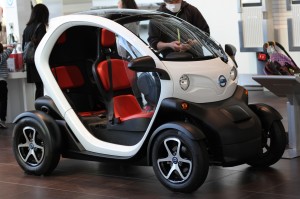The City of Yokohama and Nissan have begun an electric-car sharing service in, Japan to support tourism and local industry.
The capital of Kanagawa Prefecture and the Japanese multinational automotive manufacturer, also headquartered in the city, have collaborated to set up the round-trip car sharing service featuring an ultra-compact electric vehicle (EV) called the Nissan New Mobility Concept, and which is the badge-engineered version of the Renault Twizy.
Yokohama, with a population of about 3.5 million people, is Japan’s second biggest city, and is the capital of Kanagawa Prefecture. Yokohama is close to Tokyo – about a 30-minute train ride from Shinjuku Station on the Shinjuku Shonan Line. It is also Japan’s second largest port and luxury cruise destination. Historically, the city has been Japan’s gateway to the world, giving it something of a cosmopolitan air and is a popular tourist destination for Japanese and visitors from abroad.
The new car sharing service, “Choimobi Yokohama”, provides online registered users access to the service where they can pick up and return cars to any one of 14 locations around Yokohama Station. Cars can be reserved 30 minutes in advance and can be driven within the city. The service costs 250 yen (£1.80) per 15 minutes plus a 200 yen (£1.45) basic charge, with a maximum daily charge of 3000 yen (£21.80).
In order to use the service, customers must have a Japanese driver’s license, a smartphone and a credit card issued in Japan. Registration is through the Choimobi website and first time users are required to watch a video featuring the EV’s operating instructions and information on driving safety. The driving area is limited to within the City of Yokohama, and the vehicles are restricted from driving on expressways and highways (where speed limits exceed 60km/h).
The City of Yokohama and Nissan had previously conducted a two-year trial of Japan’s first one-way car sharing service using ultra-compact electric vehicles, which started in October 2013. The aim was to encourage low-emission transport options, improve the quality of transportation and promote tourism. In October 2015, the partnership began renting cars to local tour operators and businesses.
The new round-trip service is meant to further promote ultra-compact mobility and build a sustainable business model through a public-private cooperation. The service will also include guided tours around central Yokohama and long-term car rentals for local businesses.
The City of Yokohama and Nissan will continue usability and feasibility studies by encouraging various local organisations to join the programme. Nissan is a leader in zero-emission mobility, and continues to seek ways to use ultra-compact electric vehicles to improve transportation and quality of life in urban areas.
The project in the city offers access to Yokohama’s seafront location and pleasant parks which give it a relaxed atmosphere, enhanced by the smattering of historic sites and buildings in the Yamate district. Yokohama is noted, too, for having Japan’s largest and most colourful Chinatown. It is also home to the futuristic Minato Mirai 21 Development on the waterfront. The Choimobi project which is also supported by the Ministry of Land, Infrastructure and Transport, seeks to promote tourism giving an ultra-flexible transport choice to visitors to the city, where various car rental options for tourists have been available since 2015.
The Ministry also aims for this public-private partnership involving the municipality to support the industrial development of so called ‘ultra-small mobility’ vehicles of which Japanese manufacturers are investing in and developing, as well as promote low carbon emissions as part of environmental targets, and quality improvement in the daily life for citizens living in urban areas.


